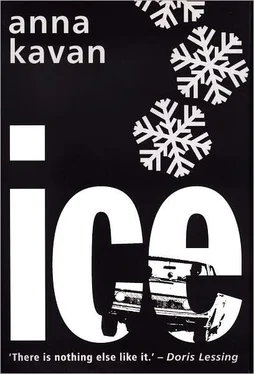I waited a few days although waiting was difficult. It was time to go. It was only a matter of hours before a disaster of the greatest magnitude. In spite of the secrecy which enveloped the subject, news must have leaked out. Agitated activity suddenly spread through the town. From my window I watched a young man running from house to house, delivering a message of terror. In an astonishingly short time, minutes only, the street was full of people carrying bags and bundles. Disorganized, and showing every sign of acute fear, they set off in great haste, some going one way and some another. They seemed to have no definite destination or plan, just the one overwhelming urge to fly from the town. I was surprised that the authorities took no action. Presumably they had failed to evolve a workable scheme for evacuation, so simply decided to let things take their course. The chaotic exodus was disturbing to watch. Everybody seemed on the verge of panic. People clearly thought I was mad to sit in a bar instead of preparing for flight. Their fears were infectious, the atmosphere of impending catastrophe made me uneasy and I was thankful to get the message I was expecting. A ship was about to anchor outside the harbour, somewhere beyond the ice. It was the last one that would call, and it would stay at anchor for one hour only.
I went to the girl, told her this was our last chance, and that she had to come. She refused, refused to stand up. ‘I’m not going anywhere with you. I don’t trust you. I shall stay here where I’m free.’ ‘Free for what? To starve? To be frozen to death?’ I lifted her off the chair bodily, stood her on her feet. ‘I won’t go—you can’t force me.’ She backed away, wide-eyed, and stood against the wall, waiting for someone or something to rescue her. I lost patience, dragged her out of the building, went on holding her arm; I had to pull her along.
It was snowing so hard I could barely see to the other side of the street; a stark, white, deathly, pre-polar scene. The arctic wind drove floods of snow past us like feathers. Walking was difficult, the wind slammed the snow in our faces, hurled it at us from different sides, whirled it round us in crazy spirals. Everything was muffled, blurred, indistinct, not a person to be seen. Then suddenly six mounted policemen rode out of the blizzard, hooves soundless and bridles jingling. The girl cried, ‘Help!’ when she saw them. She thought they would save her, tried to struggle free, made an imploring gesture with her free hand. I held on to her tight, kept her close beside me. The men laughed and whistled at us as they passed, disappearing in the blowing white. She burst into tears.
I heard a bell ringing, slowly coming nearer. An old priest shuffled round the corner, black-cowled, bent double against the storm, leading a rabble of people. The bell was the sort used to call school children from the playground; as he walked, he kept ringing it feebly. When his arm tired, he gave it a brief rest, calling out in a quavering voice: ‘Sauve qui peut!’ Some of his followers took up the cry, chanting it like a dirge: one or two paused long enough to bang on the doors they were passing. From some of the houses muffled figures crept out to join them. I wondered where they were going; it did not look as if they would get very far. They were all old and infirm, decrepit. The young and able-bodied had left them behind. They moved with weak tottering steps in a slow, shambling procession, their movements unco-ordinated, their faded faces reddened by the blast.
The girl kept stumbling in the deep snow. I had to half carry her, although I could hardly breathe. The frost tore my breath away, tried to stop me breathing; my breath froze in icicles on my collar. The frozen mucous membranes plugged my nose with ice. Each time I took a mouthful of polar air I coughed and gasped. It seemed hours before we got to the harbour. She renewed her feeble struggles at the sight of the boat, cried: ‘You can’t do this to me….’ I pushed her in, jumped in after her, seized the oars, shoved off, started rowing with all my might.
Voices screamed after us, but I ignored them; she was my one concern. The open channel had narrowed considerably, its edges frozen; soon it would be solid ice. Extraordinary loud, long cracks, like shots, like thunderclaps, came from the thickening ice of the harbour. My face felt raw, my hands were blue and burning with cold, but I kept on rowing towards the ship, through the churning white of the blizzard, through flying spray, booming ice, shrieks, crashes, blood. A small boat foundered beside us, the water seethed with frantically lashing limbs. Desperate drowning fingers clawed at the gunwale; I beat them off. A pair of lovers floated past, locked together by frozen arms, rocking and rolling deliriously in the waves. Suddenly the boat gave a violent lurch; I swung round, pulling out my revolver. I knew what had happened. Behind my back a man had climbed over the side. I fired, thrust him into the water again, watched it turn red. The ship’s side loomed steep as a cliff above us, the companion-ladder only reached to my shoulder.
Somehow or other, by a colossal effort, I managed to hoist the girl on to the wooden steps, climbed up after her, pushed her up to the deck. We were allowed to stay. No one else came aboard. The ship started moving immediately. It was a triumph.
We travelled on, changing from ship to ship. She could not stand the intense cold, she shivered continually, broke in pieces like a Venetian glass. The disintegration could be observed, she grew thinner and paler, more transparent, ghostlike. It was interesting to watch. She did not move more than was absolutely essential. Her limbs seemed too brittle for use. The seasons ceased to exist, replaced by perpetual cold. Ice walls loomed and thundered, smooth, shining, unearthly, a glacial nightmare; the light of day lost in eerie, iceberg-glittering mirage-light. With one arm I warmed and supported her: the other arm was the executioner’s.
The cold abated slightly. We went ashore to wait for a different ship. The country had been at war, the town had suffered severe damage. There was no accommodation available; only one hotel was being rebuilt, only one floor was finished, every habitable room occupied. I could not persuade or bribe anybody to take us in. Travellers were disliked and discouraged: it was natural, in the circumstances. We were told we could stay at some sort of centre for strangers outside the town, drove there through the ruined suburbs, everything flattened, no trace of trees or gardens remaining, nothing left standing upright. The country beyond had been a battlefield and was now a desert, covered in shapeless rubbish.
We were deposited at a place which had been a farm. All around was indescribable chaos. Bits of broken carts, tractors, cars, implements, lay about, bits of old tyres, bits of unrecognizable tools, all mixed up with the debris of shattered weapons and war supplies. Our escort walked cautiously, told us to look out for mines, unexploded bombs. Inside, the rooms were littered with fragments of all kind of rubbish, too smashed to identify. They took us to a room with an earth floor and no furniture, holes in the walls, roof roughly boarded over, when three people sat on the ground, propped against the wall They were silent, unmoving, hardly seemed alive, took no notice when I spoke to them. I learnt later that they were deaf their eardrums had burst. There were many in the same state all over the country, their faces ripped and lips torn by the same deadly wind. A desperately sick man lay on the floor under a thin blanket. Great tufts of his hair had fallen out strips of skin hung from his hands and face, his loose teeth rattled in black bleeding gums every time he coughed, he never stopped coughing and groaning and spitting blood Emaciated cats wandered in and out, licked the blood with delicate pointed pink tongues.
Читать дальше












